Leaving home for university can be daunting, especially if you are accustomed to small towns. Moving to a massive city like London will test you by making you leave your comfort zone and meet new people from every imaginable background. You will find the right people and places that’ll help make this city your new home. London has something unique to offer people from all walks of life. This blog will act as your Student Housing Guide London, giving you a picture of what your study abroad experience in London will look like.
There is a traditional worldview of the white British citizen that they are reserved with a ‘stiff upper lip’ attitude to life, deemed to be particularly true of Londoners – even that they are positively rude to strangers. This isn’t entirely true. London is a very progressive and welcoming city having a highly diverse mix of races and cultures. The year 2015 saw the population of London hit an all-time high of 8.5 million, and London with the second-largest immigration population in the world (after New York).
When To Start Looking For London Student Housing?
It is advisable for students to start looking for housing in London and actively explore their accommodation options well in advance. Starting the search as early as possible, ideally in the months of January to April, can help secure preferred housing choices and avoid any last-minute rush or limited availability. The demand for London student accommodation typically rises during certain months that coincide with the academic calendar and university admissions process.
While specific trends may vary, generally, the following periods see increased demand:
Peak Demand Months: The highest demand for student accommodation in London is often observed during the months of May, June, and July. This is when many students receive university offers and make their final decisions on attending a particular institution.
Summer Months: August and September also witness a surge in demand as students prepare for the upcoming academic year. This is a time when individuals may finalize their accommodation arrangements and secure housing before the start of the new term.
Pro-Tip: Once your study-abroad intake has been decided, alongside submitting your applications to universities, begin your accommodation hunt. That way, you’ll get the room of your choice, budget, and with added early bird discounts.
Things To Keep In Mind While Choosing An Accommodation
When it comes to searching for student housing in London, it’s crucial to carefully consider various factors that can greatly impact your overall university experience. Here are a few essential aspects to keep in mind:
- Budget: Consider your financial limits and ensure the rent fits within your budget.
- Location: Choose accommodation near your university and essential amenities.
- Safety: Prioritize secure neighbourhoods or housing communities.
- Facilities: Assess available amenities like study areas, laundry, and internet access.
- Roommates: Discuss compatibility and living preferences if sharing accommodation.
- Lease Terms: Review the contract details, including duration and any additional charges. Understanding how lease agreements work in general can be helpful, especially if you plan to stay in the UK long-term or even consider renting for business purposes — in such cases, knowing the essentials of a lease agreement for commercial property in UK can offer useful insights into the legal and financial aspects of renting spaces.
- Feedback: Seek reviews from current or past tenants for insights on the accommodation.
- Flexibility: Consider the accommodation’s flexibility for potential changes or early termination.
Types Of Student Accommodation In London
In London, there are various types of student accommodation available, with Purpose-Built Student Accommodations (PBSAs) being a popular choice. PBSAs are specifically designed to cater to the needs of students and offer a range of facilities and services. Here are some common types of student accommodation in London:
Studios: Studios are self-contained units that provide a private living space for an individual student. They typically include a bedroom, bathroom, and kitchenette, offering a complete and independent living experience.
Ensuite Rooms: Ensuite rooms are individual bedrooms within a larger shared apartment or flat. Each ensuite room has its own private bathroom attached, ensuring privacy and convenience.
Non-Ensuite Rooms: Non-ensuite rooms, also known as standard rooms, are individual bedrooms within a shared apartment or flat. However, instead of having a private bathroom attached, residents share a communal bathroom with other students in the same living space.
Twin Studios: Twin studios are designed to accommodate two students. These rooms typically feature two single beds, a shared bathroom, and shared kitchenette facilities. Twin studios are a cost-effective option for students who prefer to live with a roommate.
Shared Apartments and Flats: Shared apartments and flats refer to larger accommodations shared by multiple students. These typically include multiple bedrooms, a shared living area, a communal kitchen, and shared bathroom facilities. Students have their own private bedroom while sharing common spaces with their flatmates.
Explore The Best Options For Student Accommodation In London!
Book through UniAcco today!
Best Areas To Stay In London For Students
Some of London’s most popular neighbourhoods among students are listed below –
Central London
Central London is the bustling heart of the city, offering a unique and vibrant environment for students. It is home to renowned universities such as King’s College and UCL. Students residing in this area can enjoy easy access to a multitude of fascinating locations, including historical landmarks, cultural attractions, and a wide range of dining, shopping, and entertainment options.
Richmond
Richmond is a charming and historic area situated along the banks of the River Thames. With a history spanning over two millennia, it offers a picturesque urban setting. Richmond serves as a major commercial, transportation, and cultural trading hub, contributing to its economic significance. Students can explore beautiful parks, enjoy riverside walks, and experience the thriving local scene, including cafes, restaurants, and boutique shops.
Stratford
Known for its sports legacy and enthusiastic fan base, Stratford is an excellent choice for students. It offers affordable student housing options, including spacious studios and private flats with reasonable rent structures. Stratford is home to universities such as Staffordshire University and Birkbeck University, providing opportunities for education and professional growth. The area also boasts excellent transport links and a vibrant atmosphere.
Spitalfields
Located in the dynamic East London, Spitalfields is an area with a rich history and cultural diversity. The neighbourhood is known for its famous markets, including Bishop Square and Crispin Place, offering a wide range of locally produced goods. Spitalfields is also recognized for its cost-effective Purpose-Built Student Accommodations (PBSAs), providing comfortable living options for students. The area’s vibrant atmosphere, diverse food scene, and proximity to other trendy neighbourhoods make it an attractive choice.
Shoreditch
Situated in the London Borough of Hackney, Shoreditch is a vibrant district with a rich entertainment history. It has been a hub for entertainment since the Elizabethan Theatre era. Shoreditch offers a well-connected location, bordering popular areas like Hoxton, Spitalfields, and Northampton Square. Students can explore the neighbourhood’s vibrant street art, trendy bars, indie boutiques, and thriving nightlife. Shoreditch also offers easy access to cultural venues, galleries, and innovative tech hubs, creating a dynamic environment for students.
Student Accommodation In London
Now comes the main section of our blog on the London Student Housing Guide, the Student Accommodation in London. London is one of the most popular student cities, known for being extremely well-connected, making transport comparatively easier. This is so much so that we believe that it is possible to travel between any 2 points in London within two hours. Sure, 2 hours sounds like a lot of time, but considering the sheer size of this city, 2 hours is an impressive number.
This means that although your University is in one corner of London, it is completely normal to seek accommodation in a different part of the city. Besides, having student studios in London away from the central area works out cheaper. This is where having accommodation near a Tube or National Rail station becomes important. Quick access to any of these equals seamless travel anywhere in the city.
Best Properties In London
| Property Name | Price (£) | |
| Mannequin House | £239/week | |
| Spring Mews | £299/week | |
| iQ Shoreditch | £361/week | |
| iQ Tufnell House | £282/week | |
| iQ Will Wyatt Court | £288/week | |
| iQ Highbury | £263/week | |
| iQ Bloomsbury | £534/week | |
| iQ Hoxton | £320/week | |
| GoBritanya- White City Residence | £315/week | |
| The Hub | £251/week |
Off late, the trend’s been such that PBSAs are gradually gaining the upper edge of convenience, affordability, and proximity to uni. With all bills inclusive, the following properties are amongst the most sought-after at UniAcco –
1. Spring Mews
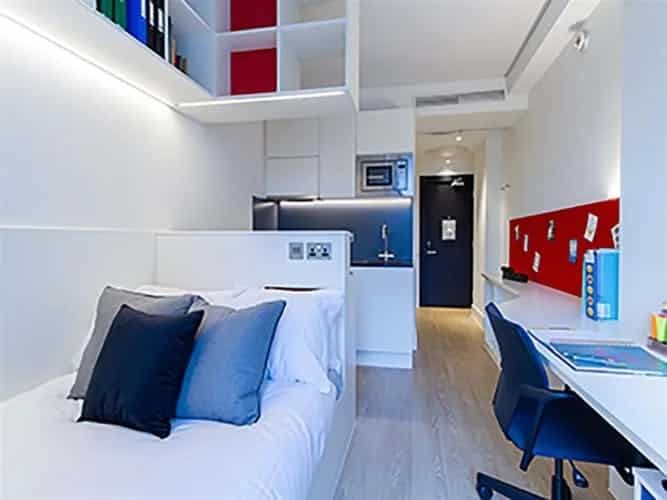
Located just around the iconic River Thames, Spring Mews offers the best student living experience. The fantastic location is just a few minutes from the bus station and Vauxhall tube & overground stations. Thus, making it accessible to reach King’s College, the University of Westminster, Imperial College, the London School of Economics and many other major universities.
2. The Hub
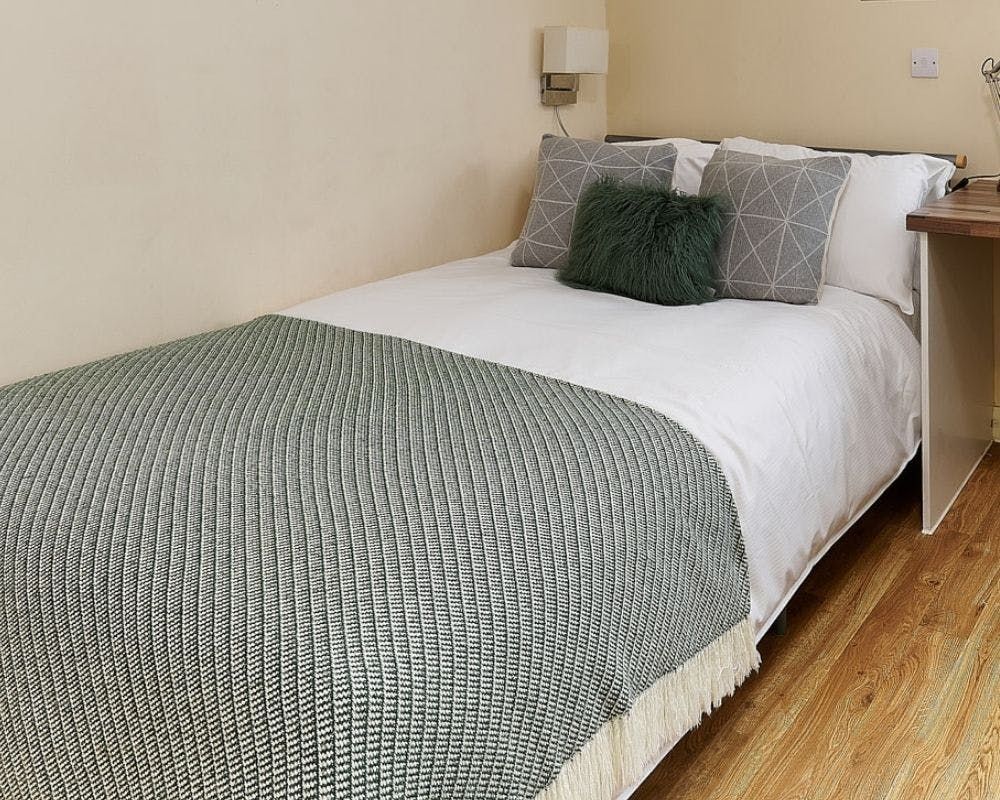
The Hub provides both international London student accommodation and UK student accommodation just minutes from both Vauxhall underground and mainline stations, providing safe and speedy access to both local and central London Universities. Students can make the best use of the large desk areas, bookshelves, a pin-board, plenty of electrical sockets for all your electrical appliances and broadband internet connections available in every room.
3. Mannequin House
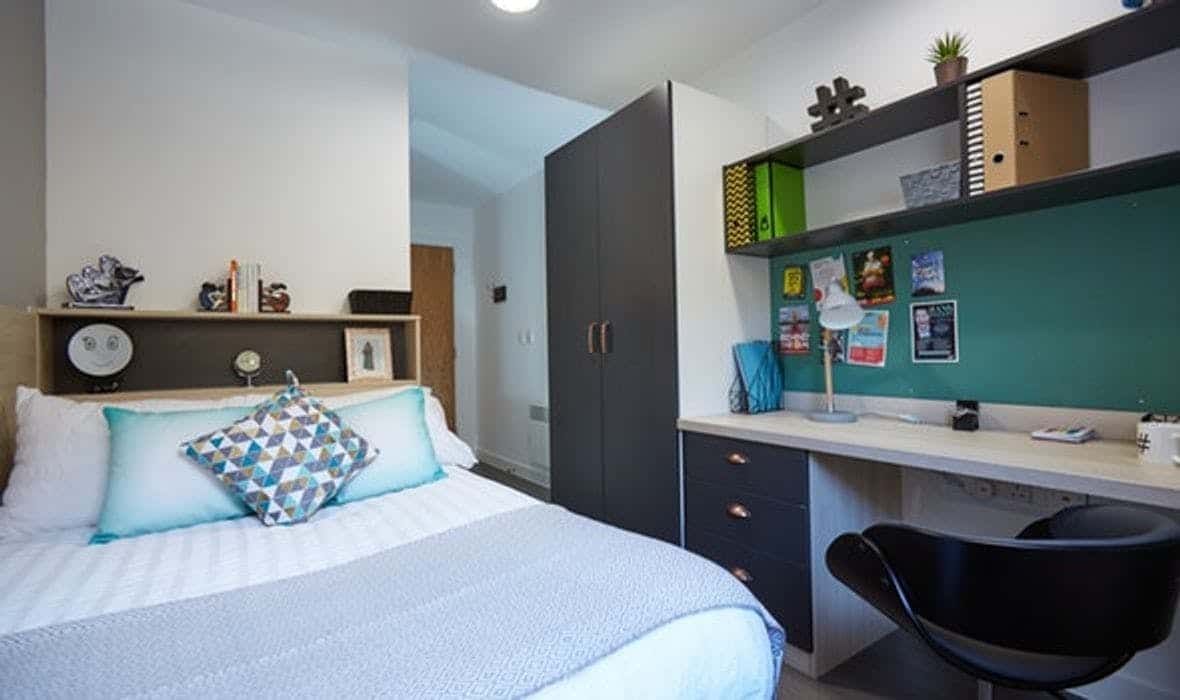
This student accommodation in London provides en-suite as well as studio rooms. Irrespective of the room choice you make, a high-tech kitchen, a Wi-Fi connection and a common room with a large TV and seating area will be provided. There is a 24/7 on-site staff available at the beck and call of students. This property offers its residents ample courtyard space, game rooms, and study rooms. It is also registered with ANUK and National Code.
4. The Hive
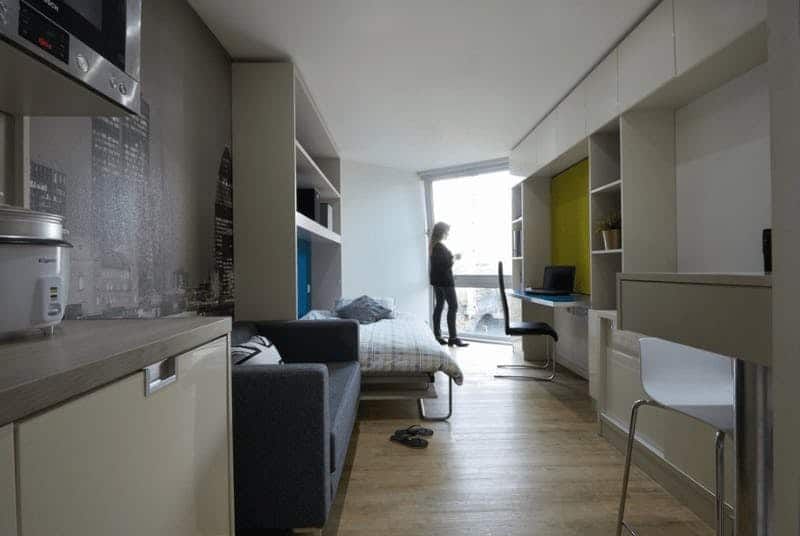
They look after every last detail, ensuring you’ve got time (and money) to enjoy your time at University. They provide a modern kitchen fully equipped with everything you will need for student life. Washing machines and dryers are located in their launderette to make sure residents look their best at all times. If that’s not enough, they have an on-site management office that is open all week long, so there is always a friendly face if you fancy a chat.
5. Newington Court
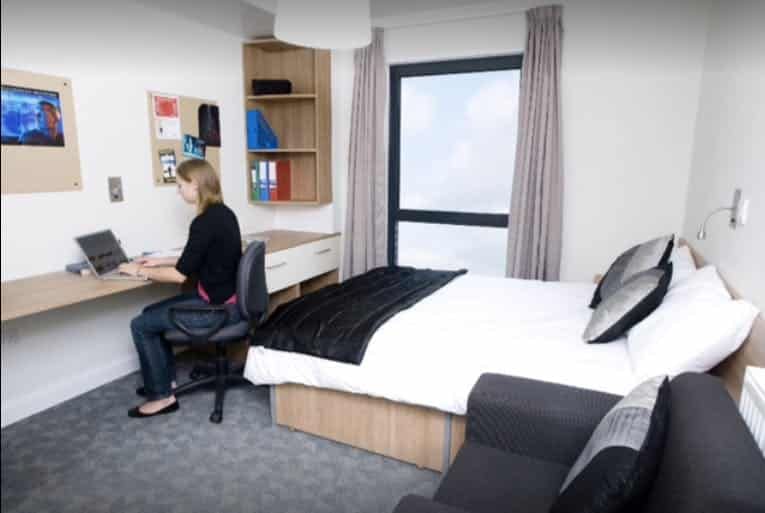
Newington Court is a perfectly designed student accommodation in London. It is perfect for students looking for student housing options near Stoke Newington. It provides you with free Wi-Fi, inclusive utility bills, 24h CCTV, bicycle parking, key card access, housekeeping, a common room and laundry.
Things To Do In London
Our Student Housing Guide London blog cannot start without listing the awesome things to do in this city. London is a vibrant city with a multitude of attractions and activities to suit every taste:
Museums
South Kensington is a hub for edutainment with three museums in close proximity: the Science Museum, Natural History Museum, and Victoria and Albert Museum. Other popular free museums worth visiting include the British Museum, Tate Modern, Imperial War Museum, and the Wellcome Collection.
Parks
Enjoy the green spaces in the city, such as Hyde Park, Regent’s Park, Greenwich Park, Hampstead Heath, Brockwell Park, and Battersea Park.
Entertainment Venues
London is a haven for art aficionados, offering a variety of entertainment venues. The O2 Arena and Wembley Arena are the largest venues, hosting major concerts, comedy shows, and sports events. Other notable venues include the Hammersmith Apollo, Royal Albert Hall, Roundhouse, and Alexandra Palace.
Buckingham Palace
Visit the iconic residence of the Royal Family, Buckingham Palace. Witness the Changing of the Guard ceremony, a free display of precision marching and music that also takes place at St. James’s Palace.
Big Ben and the Houses of Parliament
Admire the 318-foot tower housing Big Ben, the famous clock and bell, located near the Houses of Parliament along the Thames. The Houses of Parliament serve as the seat of Britain’s government.
The London Eye
Experience breathtaking views of the city from the individual glass capsules of the London Eye. This iconic attraction was built to commemorate London’s millennium celebrations.
With that, we come to the end of the ‘Things To Do In London‘ section of our blog: Student Housing Guide London.
Restaurants In London
The next section of the London Student Housing Guide is about restaurants in the city. It is a huge task for a visitor to find the ‘right place’ to eat in London – with the ‘right atmosphere’, at the ‘right price’ – largely because, as in any big city, there are literally thousands of venues from which to choose, ranging from fast food joints, pubs, and mainstream chains all the way up to some of the most exclusive restaurants in the world which attract the kind of clientele that don’t need to ask the price. Some of the must-visit restaurants that won’t burn a hole in your pocket are listed below –
| Restaurant | Description |
|---|---|
| Gordon Ramsay | A luxurious 3 Michelin-star restaurant with a renowned chef |
| Nando’s | Budget-friendly franchise known for tasty meals |
| The Breakfast Club | Offers quality comfort food at affordable prices |
| 222 (West Kensington) | All-you-can-eat lunchtime buffet for just £10 |
| Gökyüzü | Provides great value for money dining experience |
| Mildred’s | Affordable restaurant known for delicious and varied menu |
Universities In London
The most important section of Student Accommodation In London is here. London has the most universities than any other city in the UK. If you haven’t decided where in London you’d like to study, here’s a glimpse at what this city has to offer:-
London School of Economics and Political Science (LSE)
Where? Westminster, Central London.
About LSE
London School of Economics and Political Science, commonly referred to as LSE, has consistently been ranked as the best University in London and also among the top Universities in the world. As its name suggests, LSE specialises in numerical and social sciences, making this a great place to study if you’re interested in Accounting, Geography, History, Philosophy and other related subjects.
Imperial College London
Where? South Kensington, West London.
About Imperial College London
Another University in London with excellent international repute, the Imperial College London, is a world leader in research-intensive subjects. Students interested in pursuing a career in Biology, Computer Science, Engineering (of all varieties), and Medicine can aim to secure a seat in this university.
University College London (UCL)
Where? Camden, North London.
About University College London (UCL)
The Same story yet again. A world-famous university right here in London. UCL doesn’t really have an area of specialisation. It, rather, excels in every course it has to offer. So, if you’re interested in Science, Commerce or Arts, the University College London might just be the place for you.
King’s College London
Where? Various locations in Central London.
About King’s College London
Spread across five campuses, King’s College London is one of the oldest universities in England. And no, King’s College London isn’t the same as the University of Cambridge’s King’s College – people always get them mixed up! King’s College has a glowing reputation for research and offers degrees in a whole range of subjects.
Queen Mary, University of London
Where? Tower Hamlets, East London
About Queen Mary
Queen Mary, University of London claims to be the only campus-based university in London – which means it’s the only university with all of its facilities and luxury student accommodation in London in one location. It’s perfect if you want to roll straight out of bed and into your lectures.
Some other noteworthy universities are:-
- SOAS University of London
- Brunel University London
- St George’s, University of London
- Goldsmiths, University of London
- City, University of London
- University of Roehampton
- University of West London
- University of Westminster
- University of the Arts, London
- London South Bank University
Cost Of Living In London
London, being a top destination for students worldwide, comes with a reputation for its high cost of living. The expenses associated with living in the city can vary depending on factors such as location, dining choices, and social activities. What is the cost of living in London for students, you may ask. The average monthly expenses typically range between £1,237 and £1,309. Here is a table providing an overview of the approximate breakdown of monthly living expenses in London:
| Item | Cost (Per Month) |
| Off-Campus Accommodation | £408 |
| On-Campus Accommodation | £480 |
| Transportation | £159 |
| Food | £406 |
| Utility | £155 |
| Entertainment | £44 |
| Groceries | £155 |
| Clothes | £69 |
| Total Cost of Living with Off-Campus Accommodation (Per Month) | £1,237 |
| Total Cost of Living with On-Campus Accommodation (Per Month) | £1,309 |
Transport In London
London’s public transport network is the biggest and arguably the best in the UK. Its well-connected fleet of public transport includes the London Underground network (the Tube), the DLR (an automated light railway), trams, the London Overground, buses, boats, countless National Rail services, and even cable cars!
- One of the main things you’ll have to bear in mind is that ticket prices often vary depending on whether or not you’re travelling during peak hours.
- Peak fares apply from Monday to Friday (excluding bank holidays) between 6.30 am and 9.30 am and between 4 pm and 7 pm.
Off-peak fares apply at all other times.
This peak/off-peak system applies to the Tube, DLR, London Overground, TfL Rail and National Rail services in London but not to other forms of public transport (including buses).
Employment Opportunities For Students
While the cost of living in London is significantly higher than that of other cities in the UK, the saving grace is that London is home to more jobs, and more importantly, higher-paying jobs than any other region of the UK.
Part-time jobs
For students in the UK, London is a hotbed for jobs in all kinds of industries. A study shows that 67% of students use part-time jobs as a source of money. Hospitality and retail are the two biggies for students, and with its booming tourism industry and countless high streets, London has thousands of jobs in these industries that are absolutely perfect for students.
Graduate jobs and internships
Upon graduation, students from all over the UK flock to London in search of jobs. It is well documented that London proffers way more jobs compared to other parts of the UK. A study shows that over 50% of people living in the city are graduates, and the average age of graduates in London is lower than elsewhere in the UK – indicating that the movement of grads to the capital isn’t slowing down.
London is often dubbed the financial capital of the world, and the fact that countless companies, big and small, have their offices and headquarters here further substantiates this claim.
Despite efforts to increase opportunities elsewhere in the country, London is still the hub for many industries, including the performing arts, the media, banking, retail, and administration (to name but a few). As a result, there are thousands of jobs up for grabs at companies, including (but not limited to):
- ASOS
- British Airways
- BSkyB
- Deloitte
- BBC
- Fiat Chrysler Automobiles
- GlaxoSmithKline
- HSBC
- PWC
- Royal Mail
- Topshop
- UKTV
- Unilever
With this, we reach the end of the Employment Opportunities section in the blog: London Student Housing Guide.
Nightlife & Lifestyle
It’s not much of an exaggeration to say that when it comes to lifestyle and culture, London pretty much has it all. Here’s what you should know when it comes to exploring this enigmatic city.
London’s nightlife caters to all tastes. As well as each university’s own SU bar, there are literally hundreds of nightclubs in London, as well as a few thousand more bars and pubs to boot. Tiger Tiger London and Piccadilly Institute (PI) are 2 big-name city hotspots that have multiple rooms, each playing a different style of music. The highly progressive city of London also has a huge LGBTQ+ nightlife scene – especially around Soho – with the likes of Heaven, G-A-Yand the Royal Vauxhall Tavern among the most popular spots.
Here are some more London hotspots worth mentioning:-
- Bussey Building
- Corsica Studios
- DSTRKT
- E1
- Egg
- KOKO
- Proud
- Printworks
- Roadhouse
- The Pickle Factory
- Village Underground
- XOYO
- Zoo Bar.
Sports
The Brits love their sports. Especially football. A host of London football clubs ply their trade in the top tier of English football – The English Premier League. No matter what sport your interests may lie in, but here are some quick tips that sports enthusiasts may find useful when in London –
- For Premier League matches, West Ham United offers easily accessible and affordable tickets at the London Stadium.
- Arsenal, Chelsea, and Tottenham are top Premier League clubs that consistently feature in the league’s top six and also participate in European competitions.
- Other London football clubs include Fulham, Charlton, Millwall, and AFC Wimbledon.
- Wembley Stadium hosts FA Cup finals, international matches, NFL games, rugby league, and boxing events.
- Wimbledon is a prestigious tennis tournament attended by the Royal Family and celebrities.
- London’s Olympic Park hosts various sports events, including athletics and cycling.
- The London Marathon and the Varsity Boat Race are popular free-to-watch events with large spectator turnouts.
Questions To Ask Before Finalising Your Accommodation
- What is the total cost of rent, and what is included in the rent?
- What are the lease terms and duration?
- Are there any additional fees or charges, such as utilities or maintenance?
- Is the accommodation furnished or unfurnished?
- Are there any restrictions on guests or overnight stays?
- What are the rules and regulations regarding noise, cleanliness, and shared spaces?
- Are there laundry facilities available on-site or nearby?
- What security measures are in place for the building or complex?
- Is there reliable internet connectivity, and is it included in the rent?
- What is the process for reporting and resolving maintenance issues?
Moving In Checklist:
- Essential Documents: Prepare important documents such as passport, ID, and university documentation.
- Bedroom Items: Pack items like duvets, pillows, and other essentials.
- Bathroom Items: Bring toiletries like soap, toothbrushes, and other personal care items.
- Toiletries: Include allergy medicines, lotions, and other necessary toiletries.
Avoiding Rental Scams/Frauds:
- Non-Existent Rentals: Be cautious of listings for properties that do not actually exist.
- Hijacked Advertisement: Watch out for scammers posing as landlords by hijacking legitimate rental advertisements.
- Clickbait Apartments: Be wary of landlords attempting to deceive you into signing a lease or paying a deposit for a different property than the one listed.
By asking the right questions, preparing essential items, and staying vigilant against scams, you can navigate the process of finalizing student accommodation in London more effectively and protect yourself from potential fraud.
Finally…
In 1777, noted diarist Samuel Johnson famously said, “When a man is tired of London, he is tired of life.” Such is the allure of this city. Do take your time when it comes to deciding whether or not London is the city for you. But if you do decide to take the plunge and move to London, we promise you, you won’t regret it.
FAQs
1. What types of student housing are available in London for international students?
International students in London have access to a variety of student housing options, including university-owned or affiliated accommodation, private halls of residence, and private rental housing.
2. How do I book a student housing in London?
Depending on the kind of accommodation, the application process for student housing in London differs. You will normally need to apply through the university’s housing office for university-owned or affiliated housing. You can apply directly to the provider for private halls of residence. For private rental housing, you’ll need to contact a landlord or an agency and go through the application procedure they have in place.
3. How much does a student accommodation in London cost?
The cost of student living in London varies according to the type of residence, location, and facilities. On average, university-owned on-campus housing costs about £480 per month, whereas off-campus housing costs around £408 per month.
4. Are there any additional costs associated with student housing in London?
Yes, there may be additional expenses linked with your London student housing, such as utility bills, internet bills, and a deposit. Fortunately, UniAcco offers all-inclusive student accommodation in London, which means your utility costs are included in the rent.









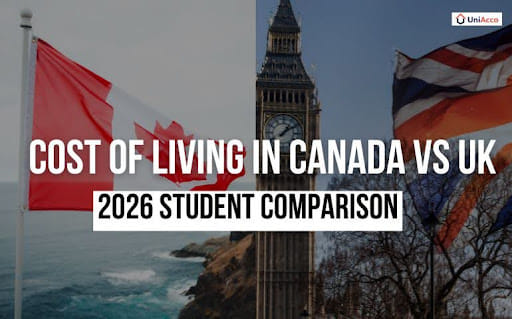





Finding an apartment in London can be a challenging process. London is an amazing city, with some amazing neighbourhoods, but as with an international, major city the demand for housing is high and the prices reflect this. I think there are a few main points to consider before you even begin looking for a flat in London: 1. Location: London is a wonderfully diverse city, from the hustle and bustle of the centre, to the more leafy environs of Kew. Only you know where you want or need to be. Maybe it is important for you to be close to work, maybe you don’t mind a commute if it means you can afford a bigger flat, or somewhere in a more gentrified area. London also has a lot of up and coming areas- Shoreditch got cool, Tottenham is on the way up. Be open to areas in a city that is constantly evolving and changing. But remember rents might get cheaper if you go further from the centre, but if you then need to travel for work, transport costs might push your budget higher anyway. 2. Budget. This basically controls everything. Obviously. Be realistic- the city is expensive, and it is what it is. You gain so much from living in London, in terms of career opportunities and in the opportunities for art and culture, it is often more than worth the rent premium. 3. Condition and size. Would you rather take a bigger flat, in less than perfect condition; or is a really nicely renovated, designed flat more important, in which case you might need to sacrifice living size. Only you can know this. There are plenty of ways to flat hunt in London- both online and in person. London also has a really well developed coliving scene, and this is not what it use to be: think private flats, not shared ones, each with their own private bathrooms and kitchens. They are fully furnished, bills and wifi included in the rent. They are so easy to move into, literally with a suitcase. I like that they have flats all over the city, so you can choose according to area and budget. There are plenty of options to choose from. Plus with coliving you get the whole community experience too: the co working spaces, the community spaces, the events and workshops. It’s a way of life, and not just somewhere to live.